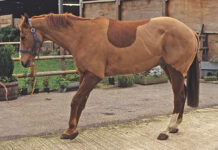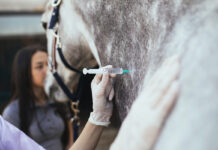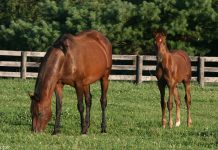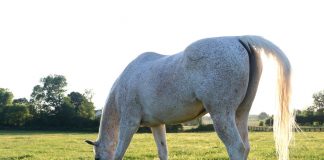Q: My horse has had several recent episodes of gas colic. I know horses aren’t supposed to burp, but when he colics, it sounds and looks like the gas is coming back up his esophagus. He gets really sensitive about his stomach, and gets a lot of built up gas. Could he have an ulcer? What else could be causing it?
Horses can’t truly burp like humans do, despite the somewhat entertaining videos on YouTube may show. Sounds such as those coming from horses that crib or make other guttural noises on command are not done via the release of true gastric gas. This is due to the design of the equine esophagus, which enters into the stomach at an angle that is so severe as to prevent the upward flow of ingesta or gas back toward the mouth. This is the same physiologic reason why horses also cannot vomit. However, what may be happening in your horse’s case is release of residual gas that is in the esophagus at times when your horse is stressed.
Gastric ulcers are certainly worth investigating in your horse’s case. Formed when the protective mucus that lines the stomach is breached by gastric acid, gastric ulcers can be quite common in horses that have high-strung personalities, as well as horses that are competing at highly demanding levels, that travel a lot, or live in a high-stress environment. Gastric ulcers can range in severity from a small, irritated area to a completely eroded stomach wall (an emergency situation). There are a handful of anti-ulcer medications on the market, and many people opt to just start their horses on these medications to see what happens, but I would strongly recommend an endoscopic exam – if you truly suspect ulcers, this will definitively diagnose them and also tell you how numerous and how bad they are. An endoscopic exam will also allow the veterinarian a good look at the esophagus itself, to see if there are any abnormalities there as well. You don’t necessarily have to bring your horse to a clinic to have this diagnostic procedure performed. Some veterinarians who make farm calls have mobile endoscopes and with light sedation, can easily perform this service and sometimes print you out color photos, to boot!
Other than gastric ulcers, here are some additional questions to consider. How fast does your horse eat? Horses that bolt their food often swallow copious amounts of air. If you find your horse does eat grain alarmingly fast, there are a few options to slow him down. Firstly, if he’s fed in an area with other horses, try to move him somewhere else where he can eat alone and not feel like someone is watching and waiting for an opportunity to steal his meal. Secondly, if your horse eats like it’s going out of style, place a few large rocks in his feed bucket. This forces him to slow down as he picks around the rocks.
Another thing to consider is cribbing. You don’t mention this in your question, but cribbers, notorious for damaging fences and ruining their incisors, can also suffer from ulcers and excessive gas. Other questions to consider include the following: has your horse been losing weight? Have there been recent changes to his environment, his schedule, or his pasture mates?
Finally, consider your horse’s diet. Is he consuming enough forage such as pasture or hay? If he spends a lot of time in a stall, consider increasing the amount of forage you are giving him. This will not only give him something to do (and grass hay is low in calories) but also provide bulk to his diet, which sustains a healthy gut environment and helps maintain proper gut motility, from nose to tail.
— Anna O’Brien, DVM
Ask your questions on the HorseChannel.com Forums >>
See more Expert Q&As >>
Submit your Ask the Expert question >>







I have kept horses for 20 years. last night my mare was turned out on new grass and after a few hours seemed to be exhibiting signs of colic. I brought her in and stood with her for 6 hours, walking her each time she tried to roll. during this time without doubt she BELCHED loudly and repeadedly, smelly belches – she passed little wind from her behind but was making loud noises from her belly. this was repeated about 12 times, sometimes she lowered her head when she belched, at others it seemed to take her by surpise. she does not crib, wind suck or have any vice and has never suffered a windy colic like this before, neither has she belched, but the amount force and noise of these belches were too much and too often to be residual in her oesophegus. I had been told they could not vomit, which i accept, however this mare recovered after about 6 hours of intermittent belching and colic symptoms and went back to eating her hay hard feed and drinking water and no more belching! sorry all you folks – there is absolutely no doubt that is what happed. PS I live in england, the state selected is only cauze there was no option for England!
I have a 4 year old mare that has the same exact symptoms. She has had intermittent episodes of severe gas and bloat so she looks like a mare that is close to foaling. She passes gas, most interestingly, she has a huge amount of air or gas that rumbles up out of her esophagus. The vet has passed a nasal gastric tube while this is happening and large amounts of air escape out through the tube. I’ve had horses for over 40 years and have never seen this happen. It appears that the entire digestive system is involved. The mare is uncomfortable but does not paw,roll,or show other signs of colic.
Good to know.
Lots of good information. Colic is another reason why horses should not be stall so long.
I have successfully used baking soda and water syringed down the side of the mouth to break up the gas. Same as people do. I learned this from a dairy farmer and credit with saving the lives of two of my friend’s horses and one of mine. Takes about 20 minutes to work and continue walking the horse and massaging the belly area.I use a large pop bottle and approx. 1/4 cup of baking soda well mixed together and a large syringe.